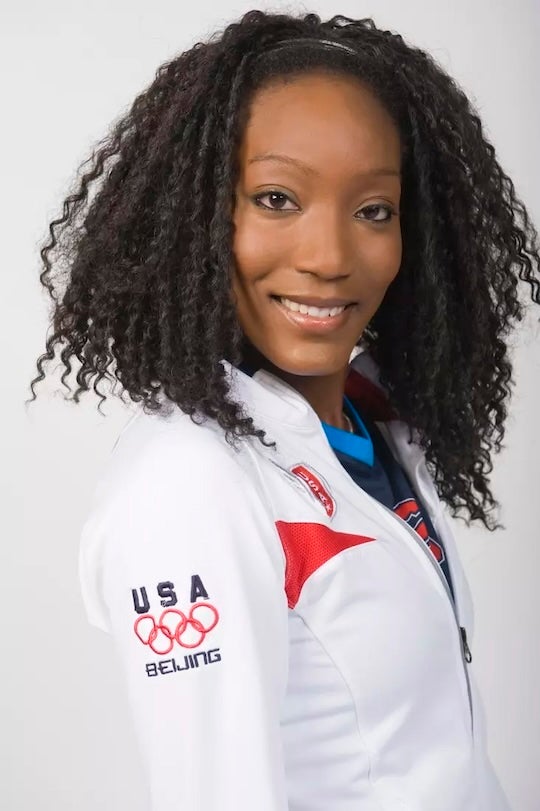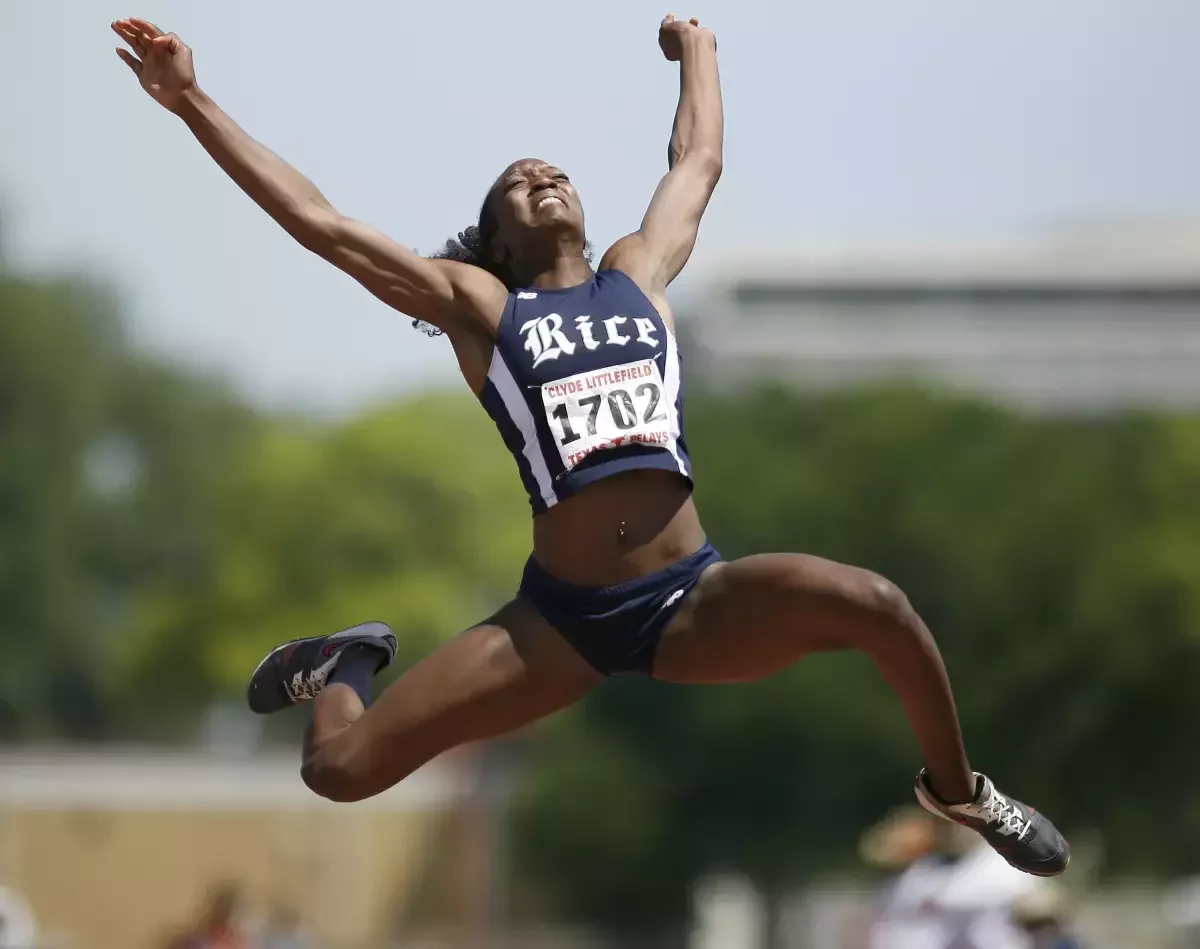Full coverage of Rice at the 2024 Olympics
As the 2024 Paris Olympics begin, a new slate of athletes look to etch their names in the history books as Olympians representing their countries, families and, in some cases, their universities.

Over the past century, many athletes from Rice University have gone on to represent the Owls on the international stage that is the Olympics.
One of those standout athletes is Funmi Jimoh.
Before being named the director of administration for Rice Athletics, Jimoh '07 carved out a storied career in track and field at Rice that resulted in her competing in the 2008 Olympics in Beijing.
Jimoh represented the United States in the long jump at the 2008 Games, qualifying for the finals and finishing 12th. She also was a three-time member of the U.S. team in the World Track Championships. At Rice, she earned All-America honors by finishing fifth at the NCAA Outdoor Championship and won the Eva Jean Lee and Fred J. and Florence Stancliff Awards during her senior season in 2007.
She was inducted into the Rice Athletics Hall of Fame in 2015. After retiring from competition, she returned to Rice as an assistant coach under Jim Bevan from 2016-18 before embarking on a career in administration in the legal profession.
To get an idea of what it’s like to compete at the highest level of her sport after such an illustrious collegiate career, Rice News caught up with Jimoh for an interview:
Tell me a bit about yourself before you got to Rice and how your passion for track and field began.
“My ‘from’ story is interesting. I was born in Seattle, Washington, then came to Houston when I was 2. I lived in Houston until I was 10, and then I lived in Fayetteville, Arkansas. I was in Fayetteville from grade six until grade 10, then I came back and I finished high school in Houston. Fayetteville is very much a part of my story and worth noting because that’s really where I got my feet underneath me with track and field and I fell in love with track and field there.
“I think that a lot of times we lean towards the things that we’re good at. And I remember seeing a high jumper named Tisha Waller on TV and people like Flo-Jo (Florence Griffith Joyner). I just thought they were beautiful, strong women, and I was like, ‘I want to do that.’ When I moved to Houston, I actually ended up having to be on the JV team, although I was really good, because of the district’s location. But Texas is a different situation than Arkansas. It’s bigger and there’s a lot more talent, so I got a little humbled. I was already a state champion as a sophomore in Arkansas, but I didn’t make it to state when I came to Texas. So I just kept on pouring into it. Track and field is a sport where you can always be practicing, and you get out of it what you put into it. So I did a lot of practicing by myself.”

How did you end up at Rice?
“I was proactive in reaching out to universities, and I went on a few recruiting trips to see what different universities were like. I went on an official recruiting trip to the University of North Carolina, because I loved Mia Hamm, I loved Marion Jones and I loved Michael Jordan. So I was like, ‘I’m going to go here because this is where all great people go right before they become amazing, right?’ And it was fine, but it didn’t resonate with me. I actually only went on an unofficial trip here to Rice and just made a family decision to come to Rice knowing that it was going to be the best opportunity to have the best education and truly be a student-athlete. That’s the decision that me and my family made, and I think it was the best decision for sure.”
What about Rice and the experience here prepared you for the Olympics?
“When I came to Rice, a lot of emphasis was placed on being amongst the best. So already the thought process of being amongst the best is something that became ingrained in my mind. When I got here, the head track and field coach was Victor Lopez, and he very much reiterated to us that we’re going to be the best. So when you live with that ethos on a daily basis, in your classroom and on the track, it puts you in a different thought process of just reaching really high levels. I had that vision that I can reach a high level because that’s the culture that was instilled in me.
“In addition to that, Rice is a pretty tough place to be at because of the requirements and expectations academically, and my resiliency was battle-tested. I think being able to persevere through that sharpened me. Rice was one of the most challenging things that I made it through, and I really felt as though I could do anything after that. Graduating from Rice helped me understand that I can accomplish something really hard, and going to the Olympics is really hard, but I can accomplish that. So I think Rice just changed the way I view everything. I view everything like that now, and I viewed the Olympic journey the same way.”

How would you describe your experience at the Olympics?
“I’m getting married this year, so I might have to stop saying this, but being at the Olympics was the best time of my life — period. It was the best experience you could ever have. The best moment was the opening ceremonies. Opening ceremonies are like a religious experience. It’s funny because I think one of the phrases for the Beijing Olympics was ‘experience amazing’ or something like that, but it really was amazing. And I was so nervous. You know, putting on the uniform that says USA is such a huge deal, and I took it very seriously. I made it to the final, which was great. The final didn’t go the way I wanted to, but out of the hundreds of people who could even make it, I’m happy to have been one of the select few that made it to the final at an Olympic Games.”
What was it like to not only represent your country but also represent Rice on that stage?
“That was a big deal for me. I think that Rice is small but mighty. And I loved being able to continue putting Rice’s name out there in different spheres. To be on the world stage and people know that there are 30 athletes from UT, there’s 20 from Florida and there’s one from Rice — it was a lot but I loved it because I think that’s amazing. And it also shows people that you don’t have to go to a huge school in order to make it. There are so many different paths to getting there, which I don’t know if people understand that is a possibility. And so hopefully I can be an example and some of my fellow Rice alums who have made it as well can be an example that you can come from a smaller, academically challenging school and still be on the athletic world stage.”
How do you feel that experience molded you, not only as an athlete but as a person?
“I feel as though it just continues to elevate what I want for myself. The ethos that we live by is ‘once an Olympian, always an Olympian.’ I remember growing up, being told by my dad that being a Jimoh is amazing and the best thing. You walk around and you wear that Jimoh cape. It’s the same being a Rice Owl. Being an Owl is amazing, and you’re representing Rice when you’re out there. And then you have an opportunity to put on the USA uniform, and you’re representing your country. Now to me, that honor comes with responsibilities. You have to conduct yourself with excellence. You have to conduct yourself in a way that represents the country well, because even after the Games, people might remember that you went. You now forever represent this country in that space.
“So I’ve had different levels of representing something bigger than me, and I feel like I was already prepared from being a Jimoh and representing my family, by representing Rice and then having such a great honor to represent the United States. It’s an honor and one that I take super seriously on and off the field. I want to be a good example to people who looked up to me the same way I looked up to Olympians before me.
What would you say was the hardest part and your favorite part about being an Olympian?
“If you have not been in the competition field of an Olympic stadium, you don’t know what to expect, so I think the hardest thing was kind of staying focused and not being overtaken by the grandeur of everything. Usain Bolt is breaking a world record, I’m on the field and everyone’s loud, and there’s so much going on. It was tough to stay centered. I always think what would I do differently? And I think I would’ve worked on my focus a little bit better, because it was a lot.

“The best thing was being able to be there with some of my favorite people, to be honest. Jim Bevan, who’s the track coach here at Rice — he was there with me. My mom got to come with me. One of my best friends Andrea Blackett, she was an assistant track coach at Rice and was the coach for Barbados at that time; she was there. It was like I brought my little piece of home with me, and being able to have an experience like that is great, but to be able to have it and share it with people who you really care about is even better. So that was the best part to me, was just being there with people that know me well.”
How do you carry your passion for track and field today and use it in your current role, as well as when you coached at Rice?
“I love the sport and I’m a student of it, so I get really involved in it. That’s how I learned, was from people who are incredibly passionate, and you could tell by the way that they spoke about it. I like to pay that back to our student-athletes, so if they have a joy for their sport, they can see someone who also has a joy for it and learn from them. Some of the character traits or things that I learned from being an athlete and being an Olympian that I just use in life is reminding people to not give up. Like I said, I never made it to state in high school, but that didn’t stop me from being Olympian. I think that’s important for people to know.
“There are so many lessons to learn in track and field, and track and field really is a metaphor for life. But one of the main things is planning. Probably more than anything I love is being prepared but not being married to whatever plan that you put out and being resilient as well. So it’s about having the foresight to make a plan but having the agility to change things when needed.”

What brought you back to Rice after graduating?
“So I love coaching, but I knew I didn’t necessarily want to actively be coaching again. However, I very much wanted to be a part of college athletics and be able to provide some kind of assistance to student-athletes as well. I am such a huge believer that the thought process of how Rice handles student-athletes is the best way. I think that you actually really can get real high-quality students who are really high-quality athletes. I know it, I’ve seen it, and it can be done. And I think that the more we invest in the student-athlete, the more we’re going to see amazing things.
“Rice has a really special place in my heart. I believe in the true student-athlete, which I think we have here. And I’m looking forward to what looks like a really good collaboration throughout the whole university. Rice is amazing already, but I can see the elevation of Rice Athletics, and I want to be a part of it too.”

